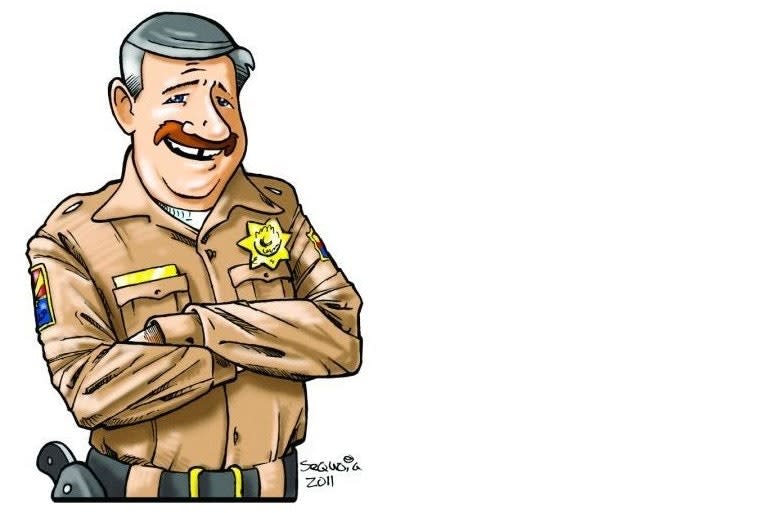The other day my wife, the Sarge, and I were sitting in our favorite local pub. It’s owned by a retired FBI Agent out of Chicago, and the theme of the place is the Prohibition era. Al Capone and Elliot Ness smile from cool black-and-white photos, and triumphant agents are shown smashing barrels of booze while gangsters with their "Tommy Guns" pose in hats and trench coats like extras from an old movie.
We were discussing the fact that my home state, Arizona, had decided it was time to allow the local citizenry to enjoy recreational marijuana without fear of incarceration. Once upon a time both of us were foot-soldiers in the effort to keep drugs off the streets, and we reflected on the idea of a free society trying to control the vices of its people. It's never turned out well.
Early in the last century, The Great War gave the Temperance Movement a huge political boost, and the Eighteenth Amendment was passed in 1919 to control the vice of drinking alcohol. For those of you that slept through history class, this led to the rise of organized crime, a general contempt for the law, and oddly enough NASCAR, as delivering moonshine and outrunning the police became not only a skill but a sport.
Just about the only legislation less popular and more ignored in our history than Prohibition was the 55-mph speed limit, which had the exact same effect, putting law enforcement in the position of enforcing something only they took seriously. Politicians, business people and even good old mom and dad ignored the 18th Amendment on the sly; likewise, driving any major highway during that gas-saving effort at social control revealed that Americans had an internal speedometer and thought 55 was foolish. This was demonstrated by the rise in popularity of CB radios and radar detectors as the citizenry attempted to avoid getting pulled over by “Smokey.” And yet, when the gas crisis was over, suddenly priorities shifted from economics to safety, and it took another few years for that effort at social control to be eliminated.
The Drug War, too, was a well-meant effort to control human vice that created laws only crime fighters really seemed to care about and enforce. Early in my career, the local prosecutor said essentially, "If it is a quantity for individual use, don't bring it to us." "Grass" possession became a ticket eventually, and in retrospect why not? The intellectual elite, entertainers, and popular culture all seemed to mock those who didn't enjoy the leaf of Cannabis sativa. My generation laughed at Cheech and Chong, and a college party without Mary Jane was no party at all. Returning friends from Vietnam, true heroes to me, would enjoy a joint and a beer and cheer our favorite teams with me on a Sunday afternoon. Anyone see a problem here?
Once I became a law enforcement officer, drug laws seemed to be quite variable based on agency and prosecutorial discretion. The federal efforts were always ongoing, yet we began to realize the prohibition of drugs was having the exact same effect as Prohibition in the 1920s. Criminalizing drugs made criminals billions, cartels and gangs blossomed, and millions of impoverished kids saw an easy way to gain large incomes in very short time-frames. I have to admit that my greatest adventures as a crimefighter, and the best people I ever worked with, came during my time working Narcotics, and I bear no ill will toward my chosen profession. But what today's rapidly changing attitude toward drug enforcement should forewarn is the same lesson not learned in our earlier venture into controlling sin: The law should be the last, not first, resort for dealing with social ills. Milton Friedman and William F. Buckley, not Leftist radicals by any means, warned us long ago about the unintended consequences of the War on Drugs.
Today, law enforcement is being blamed for the incarcerations created by these laws, criminality is rampant in major urban areas, and the only thing politicians seem intent on controlling is freedom of speech, crippling our ability to debate solutions to our social ills. Law enforcement has borne the brunt as we have attempted to make poorly thought-out laws work, and America should celebrate the programs like DARE and GREAT that we created so that we could avoid having to arrest the young as they mature.
I wish every politician in Washington, DC, would walk over to the National Law Enforcement Officers Memorial Wall and reflect on the human cost of laws and sin. Both have consequences and both create responsibilities for the representative of a free people to deal with. I hope, in the future, our elected officials will do a better job.
Dave Smith is an internationally recognized law enforcement trainer and is the creator of “JD Buck Savage.” You can follow Buck on Twitter at @thebucksavage.













